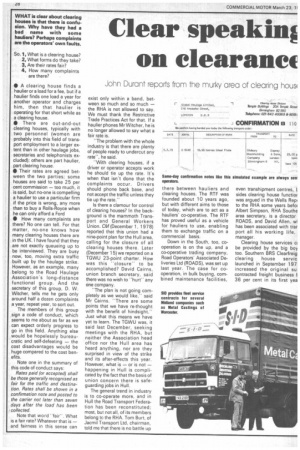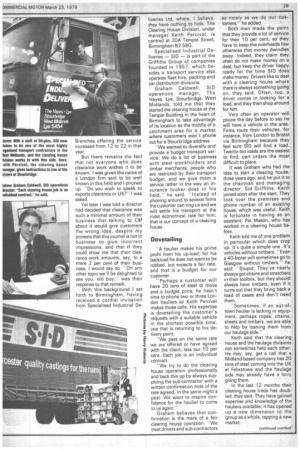Clear speaking on clearance
Page 30

Page 31

If you've noticed an error in this article please click here to report it so we can fix it.
John Durant reports from the murky area of clearing haus(
• A clearing house finds a haulier or a load for a fee, but if a haulier finds one load a year for another operator and charges him, then that haulier is operating for that short while as a clearing house.
• There are out-and-out clearing houses, typically with two personnel (women are probably into this field of transport employment to a larger extent than in other haulage jobs, secretaries and telephonists excluded); others are part haulier, part clearing house.
• Their rates are agreed between the two parties; some houses are said to take 25 per cent commission — too much, it is said, but no-one is compelling a haulier to use a particular firm if the price is wrong, any more than to buy a Rolls-Royce when he can only afford a Ford • How many complaints are there? No one can tell. For that matter, no-one knows how many clearing houses there are in the UK. I have found that they are not exactly queueing up to be interviewed. They are busy now, too, moving extra traffic built up by the haulage strike. However, as an example, many belong to the Road Haulage Association's long-distance functional group. And the secretary of this group, 0. W. Witcher, tells me he gets only around half a dozen complaints a year, repeat year, to sort out.
The members of this group sign a code of conduct, which seems to me about as far as we can expect orderly progress to go in this field. Anything else would be hopelessly bureaucratic and self-defeating — the cost disadvantages would be huge compared to the cost benefits.
Note one in the summary of this code of conduct says: Rates paid (or accepted) shall be those generally recognised as fair for the traffic and destination. Rates shall be shown in a confirmation note and posted to the carrier not later than seven days after the load has been collected.
Note that word "fair". What is a fair rate? Whatever that is — and fairness in this sense can exist only within a band, between so much and so much — the RHA is not allowed to say. We must thank the Restrictive Trade Practices Act for that. If a haulier phones Mr Witcher, he is no longer allowed to say what a fair rate is.
"The problem with the whole industry is that there are plenty of people ready to undercut any rate", he said.
"With clearing houses, if a driver or operator accepts work he should tie up the rate. It's when that isn't done that the complaints occur. Drivers should phone back base, and not accept the traffic unless they tie up the rate."
Is there a clamour for control of clearing houses? In the background is the mammoth Transport and General Workers Union. CM (December 1, 1978) reported that this union had a nine-point plan for the Hull area, calling for the closure of all clearing houses there. Later (December 15) we reported on a TGWU 23-point charter. How was this "closure" to be accomplished? David Cairns, union branch secretary, said there was no wish to -hurt' any one company.
"The plan is not going completely as we would like," said Mr Cairns. "There are some points that we have re-thought with the benefit of hindsight." Just what this means we have yet to learn. The TGWU was, it said last December, seeking meetings with the RHA, but neither the Association head office nor the Hull area has heard anything, nor are they surprised in view of the strike and its after-effects this year. However, what is — or is not — happening in Hull is complicated by the fact that the basis of union concern there is safeguarding jobs in Hull.
The general trend in industry is to co-operate more, and in Hull the Road Transport Federation has been reconstituted; most, but not all, of its members belong to the RHA. Tom Burt, of Jacmil Transport Ltd, chairman, told me that there is no battle up there between hauliers and clearing houses. The RTF was founded about 10 years ago, but with different aims to those of today, which are to act as a hauliers' co-operative. The RTF has proved useful as a vehicle for hauliers to use, enabling them to exchange traffic on a commercial basis.
Down in the South, too, cooperation is on the up, and a co-operative trading company, Road Operators' Associated Deliveries Ltd (ROADS), was set up last year. The case for cooperation, in bulk buying, combined maintenance facilities, even transhipment centres, k sides clearing house functior was argued in the Wells Rep' to the RHA some years befol Albert Simpson, RHA Southe area secretary, is a director ROADS, and David Allen, w has been associated with trar port all his working life, manager.
Clearing house services ci be provided by the big boy too. Southern BRS Clearfreig clearing house servic launched in September 197 increased the original su contracted freight business k 36 per cent in its first yea Branches offering the service increased from 12 to 22 in that year.
But there remains the fact that not everyone who does clearance work wishes it to be known. I was given the name of a London firm said to be well known in this field and I phoned up. "Do you wish to speak to exports clearance or UK?" I was asked.
Yet later I was told a director had decided that clearance was such a minimal amount of their business that talking to CM about it would give customers the wrong idea, despite my protests that this journal is not in business to give incorrect impressions, and that if they could show me that their clearance work amounts, say, to a mere 2 per cent of their business, I would say so. "On any other topic we'll be delighted to see you, old boy," was their response to that remark.
With this background I set forth to Birmingham, having received a cordial invitation from Specialised Industrial De liveries Ltd, where, I believe, they have nothing to hide. The Clearing House Division, under manager Keith Percival, is centred at 20A Temple Street, Birmingham B2 5BG, Specialised Industrial Deliveries — SID — is part of the Griffiths Group of companies founded in 1957, which besides a transport service also operates fleet hire, packing and car distribution divisions.
Graham Caldwell, SID operations manager, The Hayes, Lye, Stourbridge, West Midlands, told me that they started the clearing house at the Temple Building in the heart of Birmingham to take advantage of its location as the middle of a catchment area for a market where customers won't phone out for a Stourbridge address.
"We wanted to diversify and provide a budget transport service. We do a lot of business with steel stockholders and timber merchants, people who are restricted by their transport budget, and we give them a service rather in the way an in surance broker does in his
field,he said. "Instead of phoning around to several firms
the customer can ring us and we will settle his transport at the most economical rate for him; that is our concept of a clearing house.
Dovetailing
"A haulier makes his prime profit from his up-load; for his backload he does not want to be robbed, but expects a fair rate, and that is a budget for our customer.
"Perhaps a customer will have 20 tons of steel to move and a budget price; he hasn't time to phone two or three London hauliers so Keith Percival makes those calls. His expertise is dovetailing the customer's requests with a suitable vehicle in the shortest possible time, one that is returning to his delivery point.
"We pass on the same rate we are offered or have agreed with the client, less our 10 per cent. Each job is an individual contract.
"We try to do the clearing house operation professionally and back this up by always supplying the sub-contractor with a written confirmation note of the rate agreed, in the same night's post. We want to inspire confidence for the haulier to come to us again."' Graham believes that confirmation is the mark of a fair clearing house operation. "We treat drivers and sub-contractors
as nicely as we do our customers,he added.
Both men made the point that they provide a lot of service for their 10 per cent, so they have to keep the overheads low otherwise that money dwindles away. Indeed, they claim they often do not make money on a deal, but keep the driver happy ready for the time SID does make money. Drivers like to deal with a clearing house where there is always something going on, they said. Often, too, a driver comes in looking for a load, and they then shop around for him.
. Very often an operator will phone the day before to say he will have a vehicle in the area. Firms route their vehicles, for instance, from London to Bristol via Birmingham because they feel sure SID will find a load. Twenty-ton loads are the easiest to find; part orders the most difficult to place.
It was Graham who had the idea to start a clearing house, three years ago, and he put it to the chairman and managing director, Sid Griffiths. Keith joined soon after the start. They took over the premises and phone number of an existing house, which was useful. Keith is fortunate in having as an assistant, Pat Mason, who has worked in a clearing house before.
Keith told me of one problem
in particular which does crop up. It's quite a simple one. It's vehicles without timbers. "Even a 40-footer will sometimes go to Glasgow without timbers,he said, "Stupid. They've nearly always got chains and stretchers in their toolbox, but they should always have timbers, even if it turns out that they bring back a load of cases and don't need them.
"Sometimes, if an out-of town haulier is lacking in equipment, perhaps ropes, chains, sheets and timbers, we are able to help by loaning them from our haulage side."
Keith said that the clearing house and the haulage divisions can sometimes help each other. He may, say, get a call that a Midland-based company has 20 tons of steel coming into the UK at Felixstowe and the haulage side may already have a lorry going there.
In the last 12 months their clearing house trade has doubled, they said. They have gained expertise and knowledge of the hauliers available; it has opened up a new dimension to the group as a whole, tapping a new market.
















































































































